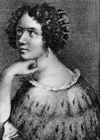Elena Lucrezia Cornaro Piscopia

June 5, 1646 - July 26, 1684
Written by Sarah Thieling, Class of 1999 (Agnes Scott College)
Elena Lucrezia Cornaro Piscopia was born into a noble Venetian family on June 5, 1646 in Venice, Italy. Her father, Giovanni Baptista Cornaro, was the Procurator of San Marco and a highly esteemed Venetian. Elena's mother, Zanetta Giovanna Boni, was not a member of the privileged upper class prior to her marriage. Elena's father spent his life establishing the Cornaro name, a name which is to be remembered forever because of his eldest daughter's intellect.
Beginning at age seven, Elena Piscopia received tutoring in the classical languages of Latin and Greek, as well as grammar and music. In addition to speaking both Latin and Greek fluently, Elena mastered Hebrew, Spanish, French, and Arabic. Her command of languages brought the title Oraculum Septilingue. Elena also exhibited marvelous reasoning powers. She was a student of the sciences as well as of languages, and she studied mathematics and astronomy in addition to philosophy and theology. Elena's greatest love was for philosophy and theology. In 1672 Elena's father sent her to the distinguished University of Padua to continue her studies.
Elena Piscopia did not seek degrees from the University of Padua; she simply wanted to continue her learning. However, Giovanni Cornaro insisted that the world recognize his daughter's incredible knowledge. Thus, at his insistence, Elena applied for a Doctorate of Theology degree from the University of Padua. Her application met with resistance. Officials in the Roman Catholic Church refused to confer the title of Doctor of Theology upon a woman. Elena applied, again, at her father's insistence. This time the Church compromised and allowed Elena Piscopia to apply for a Doctorate of Philosophy instead.
Elena Piscopia's Examination for the Doctor of Philosophy degree was to be held in the University Hall of the University of Padua, but due to the multitude of spectators it was transferred to the Cathedral of the Blessed Virgin, Padua. Throughout her examination, Elena's brilliant answers amazed and awed her examiners, who determined that her vast knowledge surpassed the Doctorate of Philosophy. On June 25, 1678 Elena Lucrezia Cornaro Piscopia received the Doctorate of Philosophy degree from the University of Padua. At age thirty-two she was the first woman in the world to receive a doctorate degree. In addition to the doctorate degree, Elena Piscopia received the Doctor's Ring, the Teacher's Ermine cape, and the Poet's Laurel Crown.
By age seventeen Elena Piscopia was considered to be an expert musician. During her life, in addition to mastering the sciblis of her time-which means she mastered almost the entire body of knowledge-Elena mastered the harpsichord, the clavichord, the harp, and the violin. Her mastery of musical instruments was crowned by the music she composed.
Elena Piscopia was an esteemed member of various academies throughout Europe, and she received visits from scholars of all parts of the world. Elena enjoyed debating, giving lectures in theology, and composing music. In Hypatia's Heritage, Margaret Alic states that she became a mathematics lecturer at the University of Padua in 1678. Her writings were published in 1688 in Parma, Italy after her death. Even today Elena Piscopia is widely quoted by other scholars and writers.
After successfully receiving her degree from the University of Padua, Elena Piscopia devoted her life to charity. She abdicated her place in Venetian society and refused several important marriages, instead taking the habit of a Benedictine oblate. During the last seven years of her life, Elena focused on learning and ministering to the poor.
Elena Lucrezia Cornaro Piscopia died at age thirty-eight on July 26, 1684. Her death is believed to have been caused by tuberculosis. Her passing caused great mourning in Padua; a truly remarkable woman had died. Elena's last wish was to be buried in the Church of Santa Giustina at Padua, Italy. In 1895 Abbess Mathalida Pynsent of the English Benedictine Nuns of Rome had Piscopia's tomb opened. Her body was reburied in a new casket and a tablet, extolling her virtues and relating the story of her life, was placed at her head.
In 1685 the University of Padua had a medal struck in honor of its great student. Today Elena Lucrezia Cornaro Piscopia's statue sits in the esteemed University of Padua in Italy. She is remembered in the United States by the stained glass window at Vassar College which depicts her defending her theses at the Cathedral of Padua.
December, 1995
References
- Forbush, Gabriell E. "Lost Women." MS. vol. 3, no. 56, Jan. 1975, p.56 compiled by Judith Wilson.
- Fusco, Nicola. Elena Lucrezia Cornaro Piscopia: 1646-1684. Pittsburgh: The United States Committee for the Elena Lucrezia Cornaro Piscopia Tercentenary. 1975. Limited First Edition.
- Pace. E. A. "Cornaro." New Catholic Encyclopedia. Vol. 4, 1967.
- Remiddi. Marcia. "A Woman of High Degree." Unesco Courier, Vol. 31, July 1978, 12-13.
- Alic, Margaret. Hypatia's Heritage: A History of Women in Science from Antiquity through the Nineteenth Century, Beacon Press, Boston.
- Guernsey, Jane Howard. The Lady Cornaro, Pride and Prodigy of Venice, College Avenue Press, New York, 1999.
